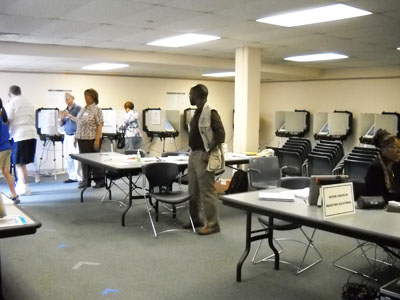Election voting on the Internet ‘inevitable,’ experts say
By Sam Smith
[email protected]
Democrats and Republicans agreed that Internet voting is “inevitable” for the future of America’s election process at a panel hosted by the University of Maryland’s Center of American Politics and Citizenship on Capitol Hill Wednesday.
“Its just a matter of time until people demand that we vote on the Internet. People do everything on the internet,” said Republican Dave Mason, a former commissioner of the Federal Election Commission.
Would online voting actually get more people to vote?
Democrat Bob Carey, former director of the Federal Voting Assistance Program, said that online voting would likely lead to a higher voting turnout. He said that at the very least it guarantees more military votes would be counted.
“In the 2010 election, there were approximately 220,000 military voters, who would have otherwise voted if they had the same voter participation rate as the rest of the population,” Carey said. “I’ve been out at sea. It takes two, three, four weeks to get a letter. We always had Internet access. We have printers on board. We can easily get those ballots out there. When I was at FVAP, I strongly advocated online voting.”
Although Mason supports online voting, he said he does not feel that online voting would lead to increased voter participation. Other efforts made to increase voter turnout, such as early voting, have not lead to more votes.
Mason also noted that online voting would change the way in which candidates and parties will have to appeal to the voters.
“There is a big social difference in the way that we govern ourselves,” Mason said. “It will change the nature of voter appeal, the kinds of appeals that we make towards voters when they make the decision at their computer.”
New security and fraud risks in online voting
State Voter ID laws have made voting fraud a hot-button issue that Republicans see as important and Democrats view as insubstantial. The prospect of online voting would certainly introduce new security and fraud risks.
But Carey said that although there are risks associated with an online voting system, there are security risks associated with any voting system, especially the current system pointing out the debacle in the extraordinarily close 2000 presidential election.
“You can essentially eliminate the possibility of someone being able to hack into a Virtual Private Network and change a ballot. Can someone hack into a VPN? Sure. Can they hack into a VPN without being detected? Virtually impossible,” Carey said. “ I really do believe that full Internet voting is something that we eventually need to get to. This is something that definitely needs to be discussed, funded, researched, developed and deployed.”
Mason said that the major threat in an Internet system is not likely to come from hackers, but from how easy it will be to influence the votes and possibly pay off voters.
Making it easier to vote
With just 41.7% of eligible voters casting a ballot in the 2010 elections, the panel discussed ways in which the voting process can be made less difficult.
“When you look at the percentage of people that vote knowing what people have gone through to get to vote, is very discouraging,” said Laura Still Thrift, senior legislative assistant for U.S. Rep. David Price, a North Carolina Democrat.
Difficulties for voters largely depend on the individual state’s election laws. Marty Stone, a former member of the Democratic Congressional Campaign Committee, said that it’s easier to vote in some states than others because of strict absentee ballot laws.
In states such as Virginia and Tennessee, voters that wish to cast absentee ballots must provide a legal reason to vote through the mail. States such as California and more recently, Maryland do not require an excuse to vote through the mail.
Better access to voting in some states than others
“As an American citizen, it distresses me that people of California have more access to voting then someone in Delaware, or that someone in Tennessee is less likely to vote then someone in Oregon,” Stone said.
Thrift mentioned that Price has co-sponsored a number of bills that would make it easier for people to cast their vote.
One bill would prohibit the requirement for photo identification, a new mandate in some states. Another would permit same-day voter registration so that people don’t have to take time in advance to register. Another one would ensure that if a state allows you to vote by mail, it would allow everyone to vote by mail.
Thrift also discussed measures in which the registration process could be modernized. For example, allowing people to register when they have any interaction with the federal government and requiring colleges to educate out-of-state students on the state’s voting laws so the students can change their residency.
“This is pushing back against efforts that make it harder and more difficult to vote,” Thrift said.
However, as Mason said during the earlier Internet voting discussion, making voting easier will not guarantee an increased turnout.
“One of the remarkable things to me when looking at voting statistics as we have taken down barriers to vote and made it easier to register, expanding the franchise, voter participation rates have not tended to go up,” Mason said. “ In fact, in some cases there have been a slight negative result.”

MarylandReporter.com is a daily news website produced by journalists committed to making state government as open, transparent, accountable and responsive as possible – in deed, not just in promise. We believe the people who pay for this government are entitled to have their money spent in an efficient and effective way, and that they are entitled to keep as much of their hard-earned dollars as they possibly can.

